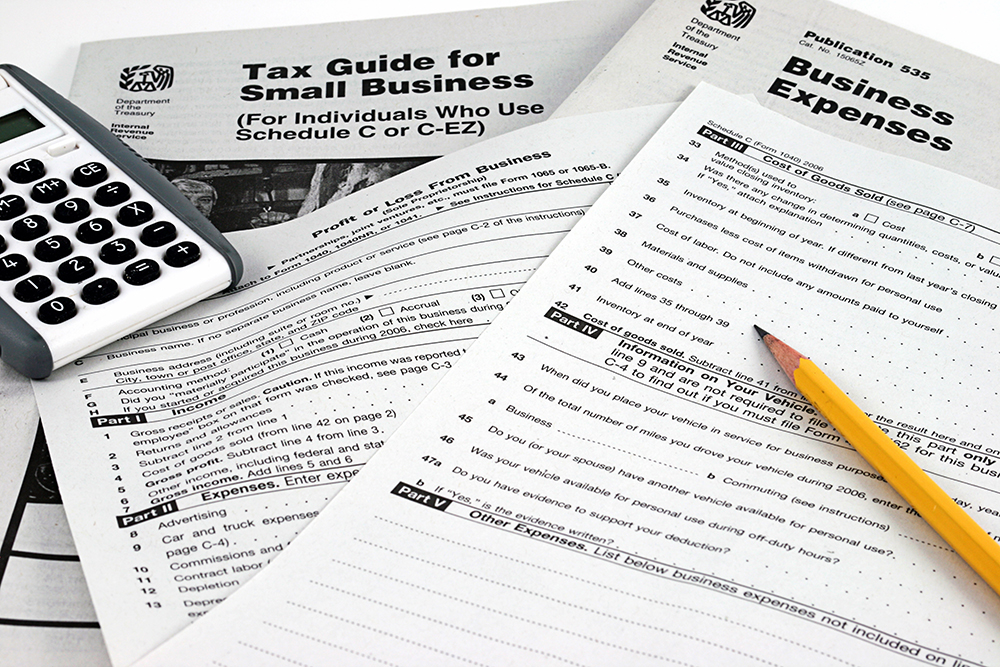Adapted from an article originally published by Joyce M. Rosenberg on The Hartford Small Biz Ahead website. Click here to review the full article. Always consult with a tax professional about your specific business tax situation.
Much of what business owners spend on their companies—their business expenses—can be deducted from their gross income to reduce their taxes. The list of deductible business expenses includes common ones like office rent, salaries, and computers, but might also include less common expenses, such as water bills and window cleaning.
Definition of a Business Expense
The IRS defines a business expense as one that is ordinary, necessary, and directly related to running a company to be deductible. Most business expenses fall into specific categories. Categorizing expenses is an important part of keeping good business records. The IRS wants business expenses accounted for and reported in the correct categories so it can determine if the deductions are legitimate. Categorizing expenses correctly may also mean a smaller bill from your accountant at tax time.

Universal Small Business Operation Expenses
Some deductible business expenses are universal—all small business owners incur them. As companies grow, they’re likely to have more expenses and, in turn, deductions. The following are some common business expense examples (listed alphabetically).
- Auto and Vehicle Expenses for Business – The IRS recognizes that many business owners use their personal vehicles for company purposes. Owners might be able to deduct a portion of what they spend to lease and maintain the vehicles—cars, SUVs, pickup trucks—but they must keep accurate records of the amount of travel done for business purposes. The IRS gives two options for computing the deduction at tax time. One is its standard mileage rate set annually. Alternatively, you can calculate the percentage of travel for business purposes, say 50%, and deduct half of what you spend on:
- Leasing
- Insurance
- Repairs
- Fuel
- Garage rent
- Business and Health Insurance Premiums
- Bank Fees and Interest Payments – There are a variety of fees and expenses you might incur as a small business, and some are tax-deductible. Bank fees, interest on credit cards and loans, financing costs, and depreciation are all part of the cost of doing business. As long as they don’t exceed your profit for the year, you may be able to deduct them. The Tax Cuts and Jobs Act of 2017 limits how much interest a business can deduct, but many small businesses whose revenue has averaged up to $25 million over three years may be able to deduct all their interest.
- Business Insurance – Companies can potentially write off business insurance premiums for a wide range of coverage. This may include property and casualty, workers compensation, disability insurance, health insurance, liability insurance, and coverage aimed at specific industries or professions, such as malpractice insurance.
- Business Licenses and Permits – In the case of a trade or business, especially those catering to consumers or doing construction work, owners must get federal, state, and/or local licenses or permits. These can be expensive to obtain and renew and may include the costs of being trained and certified to qualify for a license. However, as long as the costs don’t exceed your profit for the year, they may be deductible.
- Business Meals and Travel Expenses – Owners may be able to deduct the cost of business meals (e.g., taking a client out to dinner), but the IRS caps the deduction at 50% of the bill. However, with the Consolidated Appropriations Act (2021), food and beverages bought for business meals will be 100% deductible if purchased from a restaurant in 2021 and 2022. This deduction is temporary and reverts back this year (2023). The government also puts a 50% limit on car, airfare, or other transportation expenses. Learn more from IRS Publication 463, “Travel, Car and Gift Expenses.”
- Employee Benefits – Employers who offer health or life insurance and contributions to retirement plans to staffers may be able to get a deduction for these expenses, in most cases. Those who offer adoption assistance payments or dependent care benefits might also get deductions.
- Entertainment Expenses – The costs of taking clients or customers to entertainment or sporting events are generally no longer deductible under the Tax Cuts and Jobs Act of 2017, which eliminated or restricted many itemized deductions in 2018 through 2025 in favor of a higher standard deduction amount.
- Equipment, Materials, and Supplies – Any small business owner knows it takes equipment, materials, and supplies to run their company. These are typically considered fixed expenses or operating expenses. Some are deductible.
- Furniture, Equipment, and Machinery Deductions – Small businesses that own furniture, equipment, tools, and machinery will make regular asset purchases over the years. They might also make one-time purchases like computers and monitors for the office or point-of-sale systems for cash registers and checkout systems. Typically, these types of purchases should be broken down into costs and listed as business assets, not expenses. Owners also must decide whether to deduct the entire cost of an asset in the first year of owning it, using what’s known as the Section 179 deduction, or deduct its cost as a depreciation expense. The IRS has established rules for both cases and small businesses should consult a tax professional before making a big purchase.
- Health Insurance – Self-employed business owners who don’t buy health insurance for staffers can deduct the cost of their own health insurance premiums under the American Taxpayer Relief Act of 2012. The amount you can deduct depends on whether you are a single person or have a family, and it’s adjusted annually.
- Home Office Costs – People who run businesses out of their homes might be able to deduct some of the expenses for their houses or apartments. But to qualify for the deduction, home offices or businesses must meet IRS criteria. IRS Publication 587, “Business Use of Your Home,” explains the requirements and the benefits—including the ability to deduct a portion of home maintenance costs.
- Marketing and Advertising – Many of the costs of marketing, advertising, and even networking to build a business could be deductible. Items like business cards, websites, radio and TV commercials, and even the costs of creating advertising, marketing, brands, and logos may be deductible. But owners need to ensure each expense is ordinary, necessary, and has a clear business purpose to qualify.
- Membership Fees – The cost of membership, such as dues, initiation fees, and assessments to trade or industry groups and professional associations might be deductible. But social organization and country club dues are generally considered non-deductible.
- Office Supply Expenses – Office supplies as small as paper clips, rubber bands, and pens could be deductible as well as cleaning products and break room and restroom supplies. Owners must have receipts for these purchases.
- Payroll – All forms of employee compensation are deductible—wages, salary, bonuses and commissions. Whether the people working for you are full- or part-time staffers or independent contractors who receive 1099 forms from you rather than W-2s, their pay is a deduction.
- People Costs – Employers have a wide range of deductions for the costs of having a staff. Many are standard, like payroll and benefits expenses, but Congress occasionally creates temporary deductions and/or credits during economic crises such as the Great Recession or the COVID-19 pandemic, so check with your tax professional.
- Professional Fees and Business Services – You may be able to deduct business services expenses, including the money you pay your lawyer, accountant, and consultant for advice about business decisions, taxes, complying with government regulations, and other legal or financial matters. The deduction does not apply to payments made to companies that provide ordinary and usual business-related services such as cleaning and administrative services.
- Rent or Mortgage Payments – Small businesses that rent might be able to deduct their monthly payments to the landlord. And those who own their premises might deduct mortgage interest. However, the principal on the mortgage is not deductible.
- Taxes – Many taxes that business owners pay are deductions. Owners may have to pay local property taxes, and if they’re employers, payroll taxes. All are deductible. Owners should take care that all state and local taxes, including income tax, property taxes, and excise taxes, are listed on their tax returns. The payroll taxes that employers must pay include Social Security and Medicare, and both are deductible business expenses.
- Training and Education – Employers who require or recommend education, training, or professional development for employees can deduct the cost of classes under certain circumstances including:
- The business must have an existing employee education or educational assistance plan
- The training/education must aim to improve employees’ job skills and experience
- The employee must be working in the field of study during the training
- Utility Expenses for Small Business Owners – If a small business owns its premises, it pays for electricity, gas, water, and trash collection, which might be deductions. For renters, the landlord may cover those charges as part of your rent, but if the business is responsible for paying them, they might be tax deductible.
- Website and Software Expenses – The accounting software subscription you pay for each month or year and your website domain name registration could all be deductible expenses. The fees you pay to the service that hosts your website could also be a deduction.
List of Business Expense Categories for Sole Proprietors
Schedule C, the IRS form which sole proprietors use to report their income, has a business expense list with 20 broad categories, many of which are listed below. Many of the same guidelines covered above apply to these categories too. We recommend that you always consult with a tax professional for deductible expenses that apply to your specific business.
|
|
Always Research What Expenses aren’t Deductible for a Small Business
While the IRS permits a wide range of business deductions, there are many exceptions and prohibitions. These can change with the Congress’ passage of new tax laws. Before an owner takes a deduction for any expense, they should consult the IRS website and talk with a tax professional.
If you need to connect with a tax professional, contact one of our business consultants today. Call (301) 315-8091 to schedule your appointment with an area representative.
DON’T FORGET! All Maryland domestic and foreign business entities must file an annual report or request an extension by April 17, 2023, to maintain their “good standing” status with the department.
